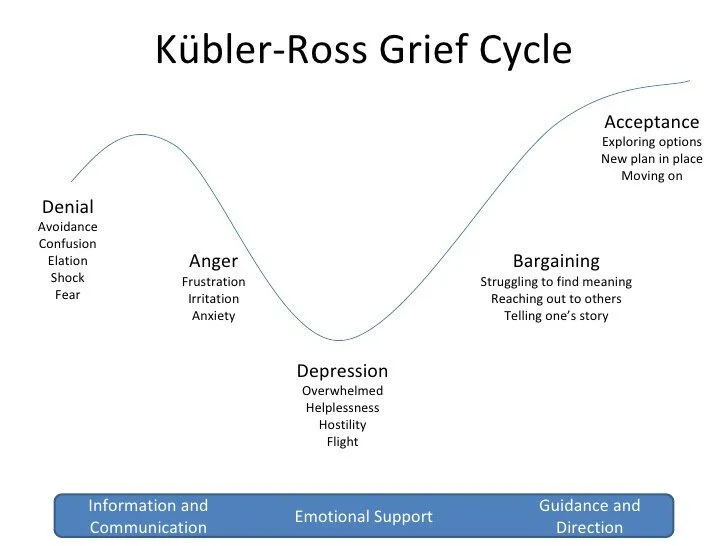Are We Doomed?
Dear We’re All Screwed,
Excellent question. I feel exactly the same way. We all do. In fact, it’s difficult for me to even respond to this question because it requires me to face the inevitable: according to the UN, without “unprecedented” action, catastrophic conditions could arrive by 2040. If you’re interested in learning more about the environmental crisis at hand, check out the BBC’s piece, Climate Change - The Facts.
I am grieving. We all have some grieving to do. The earth’s future, and consequently our future, is going to be different than we had likely hoped. I’ve found myself most leaning into denial, anger, and depression. I’ve checked my phone about a thousand times in search of any possible distraction while trying to write this. It would be more comfortable, at least in the short term, to remain blissfully unaware, maybe even try to enjoy this unprecedentedly warm winter. I feel furious that many of our elected officials and institutions are denying that climate change is happening at all and are actively rolling back the little progress we’ve made toward independence from fossil fuel energy. And, I feel overwhelmed by the hugeness of the tasks and likely calamity before us. When I try to take refuge in being a good person for sorting my trash and recycling, I’m immediately hit with the wave of depression knowing that recycling doesn’t touch the changes we need to implement to have a future for the babies of my dear friends.
I’m being honest about this because my research tells me that other people are grieving too. A recent Yale survey found that 65% of those surveyed avoided talking about global warming. “It’s culturally acceptable to talk about all kinds of anxieties, but not the climate,” said Van Susteren, a climate psychiatrist. “People need to talk about their grief. When you do nothing, it just gets worse.”
I get it. In the short term it may feel better to avoid the topic all together. Once we start discussing these things with each other, the pain is unavoidable. However, the longer we suppress our grief, the higher our rates anxiety and depression rise, and the less likely we are to take action.
We are going to need each other in order to confront this massive problem and grieve the losses that have already happened and the ones that are yet to come. We need to lean into community. Not only as a place to experience the bargaining and acceptance pieces of denial, but as a place to transform our anger into effective action.
There are some amazing groups out there to join, or you can get your pals together and form your own. The different groups already formed all have their own flavor.
Extinction Rebellion is an international movement, started in London, that uses “non-violent civil disobedience in an attempt to prevent mass extinction and minimize the risk of social collapse.” They’re big into public protests, of which you can partake. Extinction Rebellion organizes in small, autonomous groups around the world (maybe your living room!) in working to build a movement that is participatory, decentralized, and inclusive.
There are also groups set up specifically for people under 30, like Uplift and Sunrise Movement. Tell your kids, friends’ kids, etc. Talk to the young people in your life about what’s going on and ask what’s coming up for them.
350.org is an international environmental organization, headquartered in Oakland, CA.Their goal is to end the use of fossil fuels and transition to renewable energy by building a global, grassroots movement.
Or, if you’re an artist or involved in the arts, Culture Declares Emergency might be the group for you.
Importantly...
VOTE!
Vote for elected officials who believe in climate change and who have a plan and intention to do something about this now!
While, not specifically tailored to the grieving process of our earth and existence as we know it, The Good Grief Group offers ten steps to address grief that may be applicable to your process:
Step 1: Accept The Severity of the Predicament.
Step 2: Acknowledge That I Am Part Of The Problem & Solution.
Step 3: Practice Being With Uncertainty.
Step 4: Honor My Own Mortality & The Mortality Of All.
Step 5: Do Inner Work.
Step 6: Develop Awareness of Brain Patterns & Perception.
Step 7: Practice Gratitude.
Step 8: Take Breaks & Rest.
Step 9: Show Up.
Step 10: Reinvest Into Meaningful Efforts.
You’ll notice number 8 above is “Take Breaks and Rest.” This part is SO important. We all need breaks from thinking about climate change, or any overwhelming idea, memory, or experience, in order to bring our nervous systems back into a state in which we can make good decisions and take effective actions.
(I recommend resourcing with videos of kittens and puppies).
Remember that all of this does not fall on your shoulders. Using paper straws is not going to close up the ozone. Drinking out of mason jars is not going to stop sea levels from rising.
Take earth-kind actions to contribute in the small ways that you can because they fall in line with your values, help connect you to like-minded people, and connect you to a movement and dialogue that literally couldn’t be more important.
Educate yourself even if it hurts. And if it all gets to hurting too much, process this in therapy. That’s what we’re here for. Believe me, we’re processing it too.
Stay Well,
WW Team
"We can’t just be individuals, we need to join together and be a movement. It makes you less grief-stricken. The best antidote to feeling powerless is activism. It doesn’t make you less sad, but adds hope, solidarity and love."
-Bill McKibben (Climate activist for over 30 years. Runs the climate advocacy organization 350.org)




